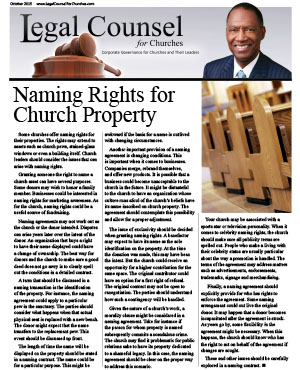Church trustees have important responsibilities. The North Carolina general statutes outline the broad powers of church trustees. Under certain circumstances, trustees may be sued as a result of their actions taken in this role. It is important for churches to understand the statutory limitations that protect trustees from liability.
The statutes state that trustees have the power to receive donations and purchase, take and hold property in trust for the church. The law states that trustees are accountable to the church for the use and management of such property. In this context, property can be personal items and/or real estate.
Generally, a church trustee is immune from individual civil liability for acts performed in the trustee role. This does not mean the trustee cannot be sued. It just means that a plaintiff can only sue a trustee up to the amount of insurance coverage that may exist. Individual civil liability beyond the insurance amount is normally ruled out.
The limited immunity rule for a church trustee is just that… limited. There are situations where a trustee can be liable for personal damages beyond insurance coverage. In these instances, the immunity rule may not protect the trustee from personal liability. Here are some instances mentioned in the statute where the immunity rule does not apply for church trustees.
Compensation – When a church trustee is compensated for his services beyond reimbursement for expenses, the limited immunity rule does not apply. In this case, a church trustee can be sued for personal liability beyond insurance coverage. To avoid this exception, churches should carefully monitor payments made to trustees to make sure the payments are not considered compensation. If payments arise to the level of compensation, there are tax implications to consider as well.
Scope of Official Duty – A church trustee must act properly to be shielded from personal liability. If the trustee acts outside the scope of his official duties, personal liability could apply. The church should have an updated position description and clear policies that govern the role of a trustee. Properly documented procedures not only make for an efficient operation, it helps protects the trustees from facing personal liabilities.
Good Faith – A church trustee should act in good faith at all time. If it is determined that the trustee acted in a manner that is not in good faith, the trustee can be sued and held personally liable for actions taken in the office.
Negligence – If a church trustee commits gross negligence or
willful or wanton misconduct that results in damages or injuries,
the immunity from individual liability may not apply. Negligence
generally means the trustee did not carry out his duty in a reasonable
way. If a trustee, as with any church officer, acts badly, it will be
difficult to escape personal responsibility.
Improper Personal Benefit – There is nothing inherently wrong with a trustee receiving a benefit in his role with the church. There could be taxable compensation implications though. The possible wrongdoing is when the personal benefits are improper. A personal benefit could be improper if the church was not informed, the benefit exceeded authority or a policy was violated in the process. Church trustees who receive an improper personal benefit void immunity for themselves.
Motor Vehicle Operation – If a trustee incurs liability from the operation of a motor vehicle, the immunity rule does not apply. This is an important exception. For this reason, the church should ensure that adequate liability insurance is in place for volunteers who operate vehicles for the church.
Derivative Action – If a trustee is the target of a lawsuit that is brought on behalf of a class of persons, the immunity protection may not apply. A derivative action is a legal claim that seeks remedies for a group of persons. In the case of a church, the group could be the church members.
Church leaders should seriously consider the legal exposure its trustees face as a result of their official duties. If insurance levels seem inadequate, have a conversation with your agent to reevaluate the policy. If policies and procedures are lacking, take steps to update the documents. Failure to make the necessary corrective steps could lead to unintended personal liability for trustees.

